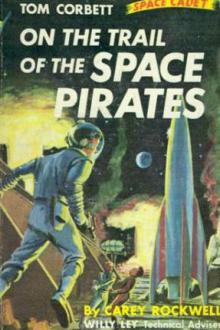Triplanetary, E. E. Smith [reading like a writer TXT] 📗

- Author: E. E. Smith
Book online «Triplanetary, E. E. Smith [reading like a writer TXT] 📗». Author E. E. Smith
“Sure you got your caffeine tablets?” he demanded as they ran.
“Uh-huh.”
“You’ll need ’em. Drive like the devil—stay ahead! You can—this heap has got the legs of a centipede and you’ve got plenty of gas and oil. Eleven hundred miles from anywhere and a population of one-tenth per square mile—you’ll be safe there if anybody is.”
“It isn’t us I’m worried about—it’s you!” she panted. “Technos’ wives get a few minutes’ notice ahead of the H-blast—I’ll be ahead of the rush and I’ll stay ahead. It’s you, Ted—you!”
“Don’t worry, keed. That popcycle of mine has got legs, too, and there won’t be so much traffic, the way I’m going.”
“Oh, blast! I didn’t mean that, and you know it!”
They were at the car. While he jammed the two bags into an exactly-fitting space, she tossed the children into the front seat, slid lithely under the wheel, and started the engine.
“I know you didn’t, sweetheart. I’ll be back.” He kissed her and the little girl, the while shaking hands with his son. “Kidlets, you and mother are going out to visit Granddad Kinnison, like we told you all about. Lots of fun. I’ll be along later. Now, Lady Lead-Foot, scram—and shovel on the coal!”
The heavy vehicle backed and swung; gravel flew as the accelerator-pedal hit the floor.
Kinnison galloped across the alley and opened the door of a small garage, revealing a long, squat motorcycle. Two deft passes of his hands and two of his three spotlights were no longer white—one flashed a brilliant purple, the other a searing blue. He dropped a perforated metal box into a hanger and flipped a switch—a peculiarly-toned siren began its ululating shriek. He took the alley turn at an angle of forty-five degrees; burned the pavement toward Diversey.
The light was red. No matter—everybody had stopped—that siren could be heard for miles. He barreled into the intersection; his step-plate ground the concrete as he made a screaming left turn.
A siren—creeping up from behind. City tone. Two red spots—city cop—so soon—good! He cut his gun a trifle, the other bike came alongside.
“Is this it?” the uniformed rider yelled, over the coughing thunder of the competing exhausts.
“Yes!” Kinnison yelled back. “Clear Diversey to the Outer Drive, and the Drive south to Gary and north to Waukegan. Snap it up!”
The white-and-black motorcycle slowed; shot over toward the curb. The officer reached for his microphone.
Kinnison sped on. At Cicero Avenue, although he had a green light, traffic was so heavy that he had to slow down; at Pulaski two policemen waved him through a red. Beyond Sacramento nothing moved on wheels.
Seventy … seventy five … he took the bridge at eighty, both wheels in air for forty feet. Eighty five … ninety … that was about all he could do and keep the heap on so rough a road. Also, he did not have Diversey all to himself any more; blue-and-purple-flashing bikes were coming in from every side-street. He slowed to a conservative fifty and went into close formation with the other riders.
The H-blast—the citywide warning for the planned and supposedly orderly evacuation of all Chicago—sounded, but Kinnison did not hear it.
Across the Park, edging over to the left so that the boys going south would have room to make the turn—even such riders as those need some room to make a turn at fifty miles per hour!
Under the viaduct—biting brakes and squealing tires at that sharp, narrow, right-angle left turn—north on the wide, smooth Drive!
That highway was made for speed. So were those machines. Each rider, as he got into the flat, lay down along his tank, tucked his chin behind the crossbar, and twisted both throttles out against their stops. They were in a hurry. They had a long way to go; and if they did not get there in time to stop those transpolar atomic missiles, all hell would be out for noon.
Why was all this necessary? This organization, this haste, this split-second timing, this citywide exhibition of insane hippodrome riding? Why were not all these motorcycle-racers stationed permanently at their posts, so as to be ready for any emergency? Because America, being a democracy, could not strike first, but had to wait—wait in instant readiness—until she was actually attacked. Because every good Techno in America had his assigned place in some American Defense Plan; of which Operation Bullfinch was only one. Because, without the presence of those Technos at their everyday jobs, all ordinary technological work in America would perforce have stopped.
A branch road curved away to the right. Scarcely slowing down, Kinnison bulleted into the turn and through an open, heavily-guarded gate. Here his mount and his lights were passwords enough: the real test would come later. He approached a towering structure of alloy—jammed on his brakes—stopped beside a soldier who, as soon as Kinnison jumped off, mounted the motorcycle and drove it away.
Kinnison dashed up to an apparently blank wall, turned his back upon four commissioned officers holding cocked forty-fives at the ready, and fitted his right eye into a cup. Unlike fingerprints, retinal patterns cannot be imitated, duplicated, or altered; any imposter would have died instantly, without arrest or question. For every man who belonged aboard that rocket had been checked and tested—how he had been checked and tested!—since one spy, in any one of those Technos’ chairs, could wreak damage untellable.
The port snapped open. Kinnison climbed a ladder into the large, but crowded, Operations Room.
“Hi, Teddy!” a yell arose.
“Hi, Walt! Hi-ya, Red! What-ho, Baldy!” and so on. These men were friends of old.
“Where are they?” he demanded. “Is our stuff getting away? Lemme take a peek at the Ball!”
“I’ll say it is! OK, Ted, squeeze in here!”
He squeezed in. It was not a ball, but a hemisphere, slightly oblate and centered approximately by the North Pole. A multitude of red dots moved slowly—a hundred miles





Comments (0)